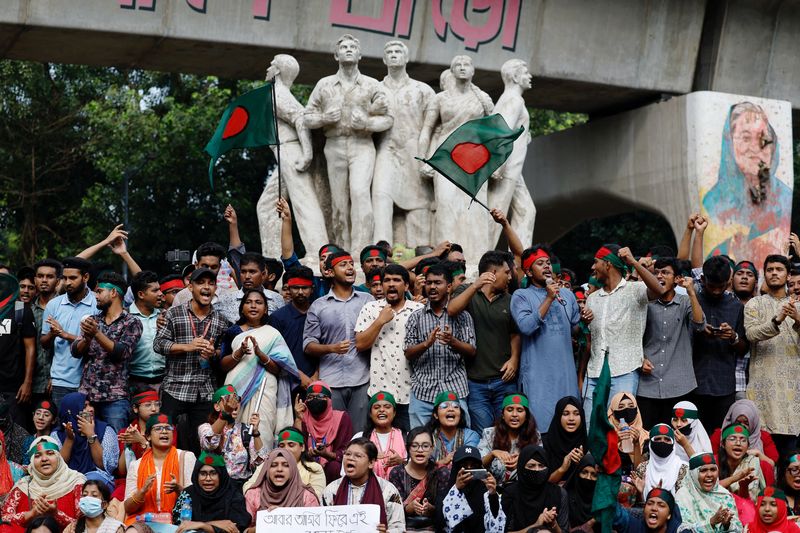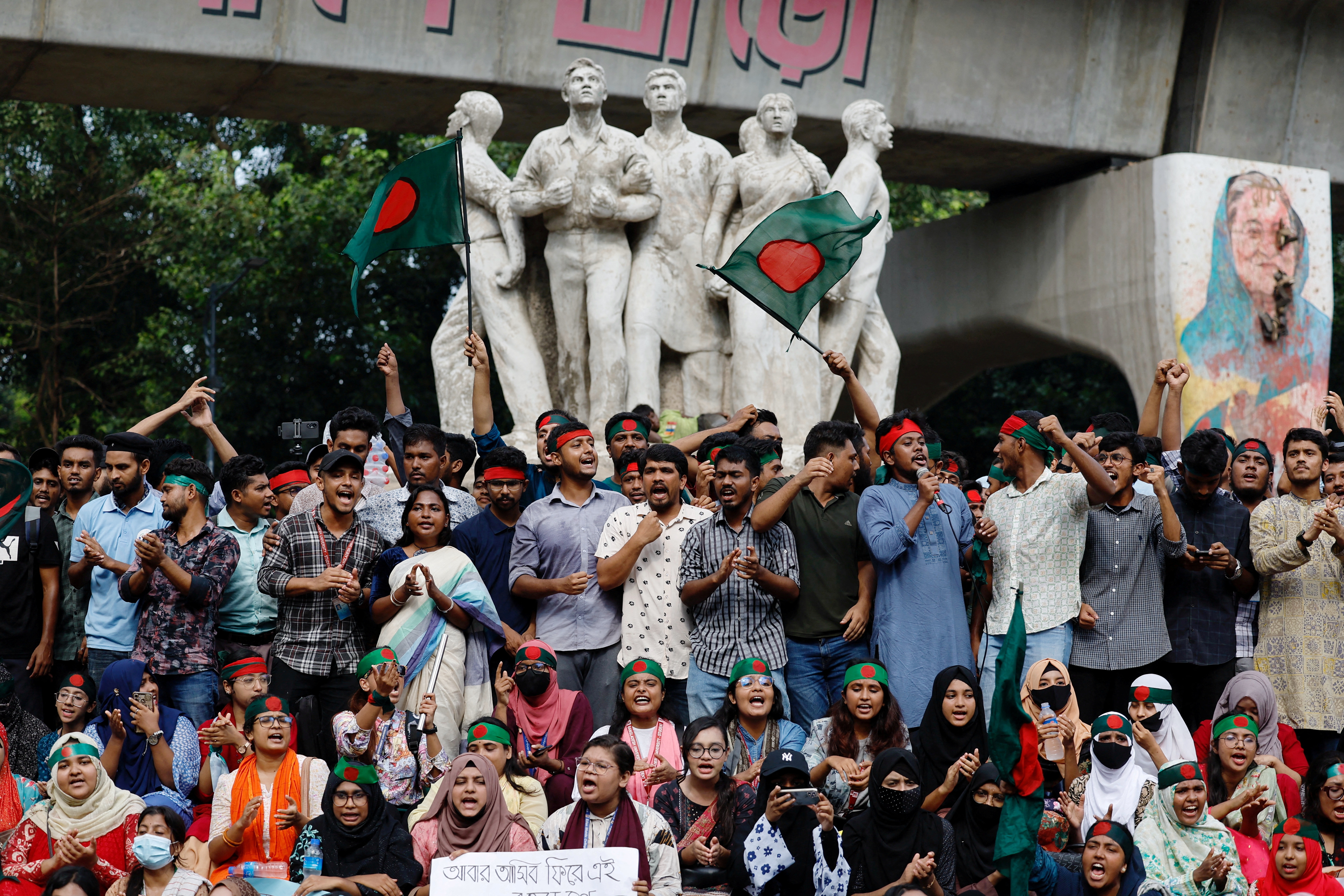Stock Markets
Bangladesh student protesters eye new party to cement their revolution

By Ruma Paul, Krishn Kaushik, Devjyot Ghoshal and Krishna N. Das
DHAKA (Reuters) -Student demonstrators who ousted Prime Minister Sheikh Hasina have rejected calls from Bangladesh’s two main political parties for quick elections and are considering creating their own party to sustain their movement, according to interviews with four protest leaders.
Their hope: to avoid a repeat of the last 15 years, in which Hasina ruled the country of some 170 million people with an iron fist.
In June, a handful of student leaders – most in their early-to-mid 20s – began organising demonstrations against a law reserving coveted government jobs for certain segments of the population.
Within two months, Hasina’s government was swept away by an upswell of popular anger at the brutality of its crackdown on anti-quota protesters. At least 300 people were killed in the single largest bout of violence since Bangladesh’s war of independence from Pakistan in 1971.
The movement was hailed as a Gen Z revolution, spurred by young Bangladeshis’ anger at years of jobless growth, allegations of kleptocracy, and shrinking civil liberties.
An interim government headed by Nobel Peace laureate Muhammad Yunus – which includes two student leaders in senior positions – now runs the country.
For most of the past three decades, Bangladesh has been governed either by Hasina’s Awami League or the Bangladesh Nationalist Party of her rival Khaleda Zia, both of whom are in their 70s.
Student leaders have discussed forming a political party to end the duopoly, said Mahfuj Alam, who chairs a committee tasked with liaising between the government and social groups such as teachers and activists.
A decision would be made in about a month, the 26-year-old law student told Reuters, adding that protest leaders wanted to consult widely with citizens before deciding on a platform.
Details of the students’ plans for their movement’s political future have not previously been reported.
“People are really tired of the two political parties. They have trust in us,” he said, at the gates of Dhaka University’s Arts Faculty.
After the story was published, Alam said on Facebook (NASDAQ:) his statement to Reuters “had come out wrong” and that the students’ main focus was to maintain the spirit of the mass uprising and to consolidate the government.
“We are not thinking about political organizations right now,” he said in the Facebook post, adding that the priority was broad reform of the political system. “Everyone will know what the political structure will be at the appropriate time.”
Tahmid Chowdhury, another student coordinator who helped bring down Hasina, said there was a “high chance” they would form a political party. They were still working out their program, though he said it would be rooted in secularism and free speech.
“We don’t have any other plan that could break the binary without forming a party,” said the 24-year-old graduate student in world religion.
The student leaders in interim government have not specified what policies they intend to pursue, beyond sweeping institutional changes – such as reforming the electoral commission handpicked by Hasina – to avoid another spell of authoritarian rule.
“The spirit of the movement was to create a new Bangladesh, one where no fascist or autocrat can return,” said Nahid Islam, 26, a key protest organiser who sits in Yunus’ cabinet. “To ensure that, we need structural reforms, which will definitely take some time.”
The government is not considering calls from the Awami League and BNP to hold fresh polls as early as fall, said Islam, who holds the telecommunications portfolio.
The regime change has forced out the chief justice, the central bank governor and the police chief who oversaw the crackdown on the students, among other officials.
A spokesperson for Yunus, who has said he is not keen on holding elected office, did not return a request for comment. Touhid Hossain, a career diplomat serving as Yunus’ de facto foreign minister, told Reuters the students had not discussed their political plans with the technocrats.
But he added: “the political scenario is going to change because we have basically excluded the young generation from politics.”
Yunus, an 84-year-old economist whose microcredit programs helped lift millions globally out of poverty, wields moral authority but there are doubts over what his administration can achieve.
“We are totally in uncharted waters, both legally and politically,” said Shahdeen Malik, a constitutional expert. “The powers of this interim government are not defined because there is no constitutional provision.”
Reuters interviewed more than 30 people, including key student leaders, Hasina’s son and adviser Sajeeb Wazed, opposition politicians and army officers to assess the divisions left in the wake of the protests and the prospects for the new government.
Hasina, whose son said she hopes to return to Bangladesh, couldn’t be reached for comment.
“The political parties are not going anywhere. You cannot wipe us out,” Wazed told Reuters from the United States, where he lives. “Sooner or later, either the Awami League or the BNP will be back in power. Without our help, without our supporters, you are not going to be able to bring stability to Bangladesh.”
COLLABORATORS
On July 19, as Hasina’s supporters and police battled student demonstrators, authorities detained three of the movement’s most important leaders: Islam, Asif Mahmud and Abu Baker Mojumder.
Mojumder told Reuters that he was sedated and beaten by law enforcement. The treatment, he said, solidified his view that Hasina had to go.
The new police chief Mainul Islam did not respond to Reuters’ questions for this story.
Previous protests had fizzled when leaders were detained but this time demonstrations raged on. Expecting to be arrested, the core of about two dozen coordinators had formed a structure in which they were supported by layers of other student-activists, said Islam, a veteran of previous protests.
Missteps by Hasina, meanwhile, fuelled public anger against her.
While the students had protested for more than a month, they were largely limited to public university campuses. Then, on July 14, Hasina held a news conference.
Half an hour in, she half-smilingly referred to the demonstrators as “razakars”. The pejorative describes people who collaborated with Pakistan during the 1971 war, which she contrasted with descendants of freedom fighters for whom many government jobs would be reserved.
The comment ignited furious mass protests.
At Dhaka University, male demonstrators were joined by female students who broke out of their five halls of residences, whose gates are locked in the evenings, said Umama Fatema, 25, a female student coordinator.
The next day, the Awami League’s student wing moved to suppress demonstrations and clashes erupted, with sticks, iron rods and stones for weapons.
‘STOP THE VIOLENCE’
The escalation in violence that week expanded the demonstrations from public campuses to private institutions, said Nayeem Abedin, a 22-year-old coordinator at the private East-West University. “We had a responsibility to come out to the street for our brothers,” he said.
Students at such institutions typically come from Bangladesh’s middle class that expanded rapidly during the robust economic growth that Hasina oversaw over much of her term.
“It felt like a turning point,” said Islam. “Private university students joined in, and unexpectedly, so did many parents.”
At least 114 people were killed by the end of that week, with hundreds more hurt. The scale of the crackdown shocked even some in the Awami League elite.
“I also told my mother: ‘no, we need to immediately tell Chhatra League not to attack, stop the violence,'” said Wazed, without providing further details. “We suspended the police officers that shot at students.”
At least two officers were suspended in early August after a video depicting the killing of a student went viral online. The student leaders plan to prosecute police and paramilitary accused of abuse.
On July 21, Bangladesh’s Supreme Court, whose judges were effectively appointed by Hasina, ruled that 93% of state jobs should be open to competition, meeting a key demand of the students. The demonstrations continued to grow.
Hasina declared an indefinite curfew on Aug. 4, a day after at least 91 people were killed. The army told the prime minister that evening it would not enforce the lockdown.

“The army chief didn’t want more bloodshed,” said one serving officer, who spoke on condition of anonymity because he wasn’t authorised to talk to media. “People from all walks of life were joining.”
The next day, as crowds marched to her official residence, Hasina fled to India.
Stock Markets
Suburban Propane director Logan sells $139k in shares
Stock Markets
Stock market today: S&P 500 closes lower, but posts big weekly win
Stock Markets
TD Bank promotes Laura Nitti to retail market president role

 Forex3 years ago
Forex3 years agoForex Today: the dollar is gaining strength amid gloomy sentiment at the start of the Fed’s week

 Forex3 years ago
Forex3 years agoUnbiased review of Pocket Option broker

 Forex3 years ago
Forex3 years agoDollar to pound sterling exchange rate today: Pound plummeted to its lowest since 1985

 Forex3 years ago
Forex3 years agoHow is the Australian dollar doing today?

 Cryptocurrency3 years ago
Cryptocurrency3 years agoWhat happened in the crypto market – current events today

 World3 years ago
World3 years agoWhy are modern video games an art form?

 Commodities3 years ago
Commodities3 years agoCopper continues to fall in price on expectations of lower demand in China

 Economy3 years ago
Economy3 years agoCrude oil tankers double in price due to EU anti-Russian sanctions





















